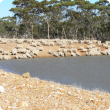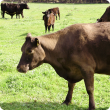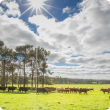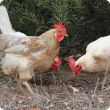Livestock biosecurity
The Department of Agriculture and Food, Western Australia’s Livestock Biosecurity Program is part of the national animal health framework that underpins and enhances Australia’s and Western Australia’s (WA) market access for animals and animal products.
The value of Australia’s export of animals and animal products relies on being able to maintain and demonstrate WA’s excellent animal health and residue-safe food status, a comprehensive livestock traceability system, regulated inter-state and intra-state movement to manage pest and diseases and industry supported disease control programs.
The Livestock Biosecurity Program manages a number of regulatory activities to support stock identification and traceability, disease surveillance, animal movement requirements and preparedness to respond to diseases such as foot and mouth disease and bovine spongiform encephalopathy (BSE). The consequences of these diseases are rated as being catastrophic to the Australian economy, and diseases such as H5N1 avian influenza and rabies may cause death in humans.
Additionally the program regulates activities to protect human health via food safety regulatory activities, chemical management and by monitoring for emerging zoonoses - diseases that can be transmitted from animals to humans.
Early detection of any significant animal disease incursion is essential to minimise the impact on the economy, the community and primary production. Any delay in detection would mean eradication and/or control will be considerably more difficult and expensive or, in the worst case scenario, may not be feasible at all.
Filter by search
Filter by topic
- Pests, weeds & diseases (101) Apply Pests, weeds & diseases filter
- Livestock health & diseases (101) Apply Livestock health & diseases filter
- Diseases (101) Apply Diseases filter
- (-) Remove Livestock disease surveillance filter Livestock disease surveillance
- Livestock & animals (82) Apply Livestock & animals filter
- Livestock species (69) Apply Livestock species filter
- Sheep (30) Apply Sheep filter
- Emergency animal disease preparedness (30) Apply Emergency animal disease preparedness filter
- Livestock management (29) Apply Livestock management filter
- Beef cattle (21) Apply Beef cattle filter
- Dairy cattle (17) Apply Dairy cattle filter
- Poultry & birds (12) Apply Poultry & birds filter
- Management & reproduction (12) Apply Management & reproduction filter
- Pigs (11) Apply Pigs filter
- Goats (9) Apply Goats filter
- Livestock movement & identification (7) Apply Livestock movement & identification filter
- Horses (7) Apply Horses filter
- Feeding & nutrition (7) Apply Feeding & nutrition filter
- Control methods (5) Apply Control methods filter
- Wildlife biosecurity (5) Apply Wildlife biosecurity filter
- Chemicals (5) Apply Chemicals filter
- Emergency response (4) Apply Emergency response filter
- Veterinary chemicals (3) Apply Veterinary chemicals filter
- Residues in livestock (2) Apply Residues in livestock filter
- Stockfeed (2) Apply Stockfeed filter
- Food, export & investment (2) Apply Food, export & investment filter
- Preventing residues (2) Apply Preventing residues filter
- Plant biosecurity (1) Apply Plant biosecurity filter
- Pests (1) Apply Pests filter
- Pest animals (1) Apply Pest animals filter
- Quarantine (1) Apply Quarantine filter
- Mechanical, physical and cultural (1) Apply Mechanical, physical and cultural filter
- Water management (1) Apply Water management filter
- Water (1) Apply Water filter
- Export services (1) Apply Export services filter
- Biosecurity governance (1) Apply Biosecurity governance filter
- Biosecurity and Agriculture Management Act (1) Apply Biosecurity and Agriculture Management Act filter
- Climate, land & water (1) Apply Climate, land & water filter
- Importing animals (1) Apply Importing animals filter
- Importing to Western Australia (1) Apply Importing to Western Australia filter
- Livestock research & development (1) Apply Livestock research & development filter








